EVE Frontier has been a game shrouded in mystery within the EVE Online universe—CCP Games has gone so far as to say it won’t even reveal how the game fits into the broader world of EVE Online. At EVE Fanfest 2025, I had a chance to go hands-on with the new survival title, and I have to admit, I think I came out more confused than when I went in. Then again, I’m not a hardcore EVE player. For those deeply familiar with the universe, it’s clear that excitement is building for a new way to explore it in all its chaotic glory.
CCP Games has been expanding into new genres at a rapid pace. There’s EVE Galaxy Conquest, a 4X strategy title; EVE Vanguard, an MMOFPS that’s entering early access soon; and now EVE Frontier, a survival game that still doesn’t have a confirmed release date. I sat down with EVE Frontier product manager Scott McCabe to better understand how the game works, what players can look forward to, and what role, if any, blockchain technology plays in it all.
CCP Games has been busting out new genres left and right, with EVE Galaxy Conquest, a 4X strategy, EVE Vanguard, an MMOFPS releasing into early access soon, and now EVE Frontier, a survival game without a solid release date. I was able to sit down with the Product Manager on EVE Frontier, Scott McCabe, to try and understand a bit more about how it works, what players have to look forward to, and what the heck blockchain has to do with any of it.
Tell me a little about yourself and your role on EVE Frontier.
Scott McCabe: Sure. So my name is Scott McCabe, also known as CCP Overload. I’m the product manager for EVE Frontier here at CCP. I work with the direction layer, kind of a step between the engineering and the direction layer. I work a lot with the community as well to make sure what we’re building is cohesive.
For those that don’t know, including me, can you explain the general idea of EVE Frontier?
Scott McCabe: Sure. At its heart, EVE Frontier is a survival game set in space. It focuses on self-reliance, moment-to-moment gameplay and unlocking third-party development. And you may say, “Hey, what does any of that mean?” It’s a fair question. I think the easiest way to do it is to sort of use other things as a baseline to talk about.
“I also played EVE Online for 17 years.”
And EVE Online is a spaceship MMO. I quite often say that it’s not actually a game. It’s 17 games in an overcoat, trying to sneak into the cinema. There are all these different ways to play it. There are all these different things to do in EVE Online. It’s a space opera. Empire building and galactic scale, huge organizations, wealth manufacturing. Just a big, vibrant, populated galaxy.
EVE Frontier is the opposite of that. The galaxy of EVE Online, New Eden, has got its biblical references. EVE Frontier is the fall from grace. You know, they’ve eaten the apple and been turfed out of Eden. And it’s dark. You’re in this hostile post-apocalyptic world. All the lights and shine of New Eden. Not there. It’s just grit. The vestiges of an ancient civilization that has crumbled. Rotted. And you don’t even know why.
This was some huge, powerful civilization that was building effigies to themselves, like the size of a moon. And now they’re all gone, and it’s just wasted away. There’s no one there to help you. It is like you woke up instead of being in, you know, Reykjavik. You’re in the middle of The Walking Dead. It’s just like the world itself is trying to kill you. There are little pockets of survivors trying to make a living somehow and stay alive. That’s how I would kind of compare the two.
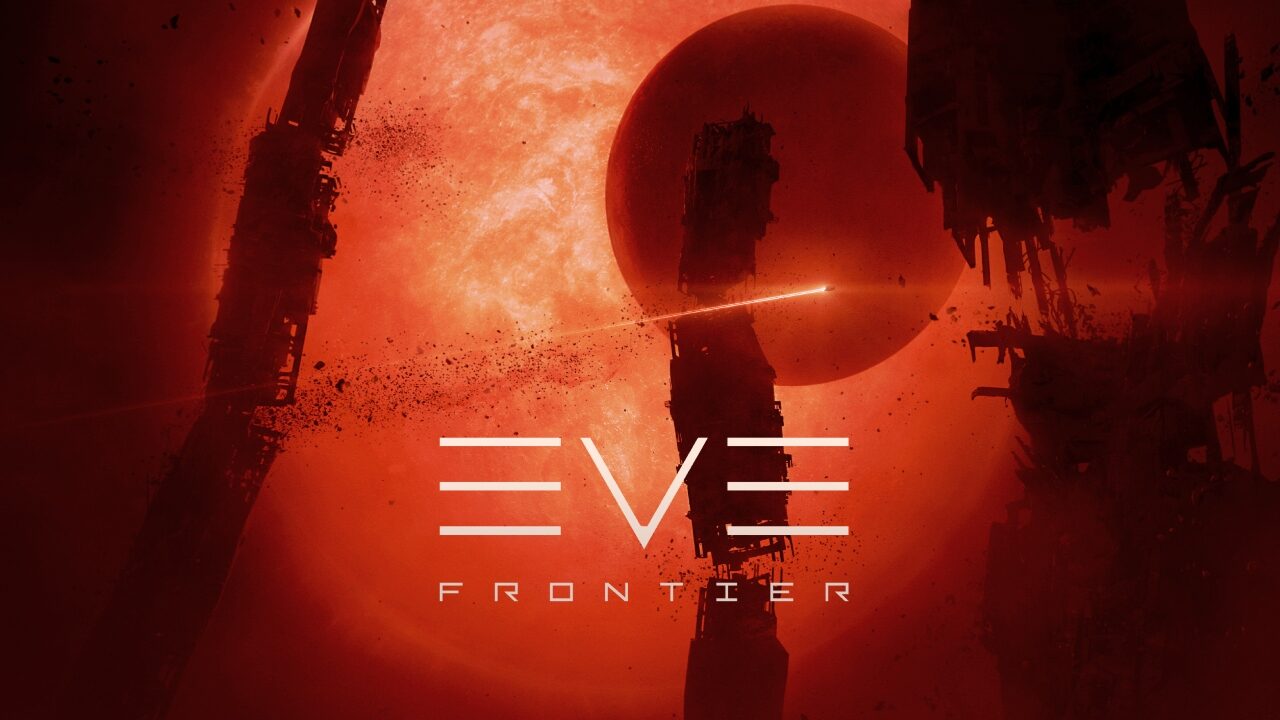
Is EVE Frontier primarily a solo experience, then, or is it a bit of an MMO as well?
Scott McCabe: Yeah. It’s both, really. That’s the answer. It’s a really easy question to answer, and it can be answered in just two words. It depends. You are totally able to play it as a solo player. You’re also totally able to get a few people and make a group. You’re also able to build bigger and bigger groups, and to use your zombie, Walking Dead analogy again, there are people, survivors, who are like lone wolves. And then there are people who are building up little communities in a small area, and then you see those towns where they have the gates with guards, and they’ve got their little laws and how it works in their town, maybe their own, like bartering system.
Systems that are thriving.
Scott McCabe: Yeah. Until someone actually lets a zombie in and it all goes down. So yeah, you can play it either way.
A little off topic, but Astrophysicists are on the team at CCP Games. Can you explain what that has to do with EVE Frontier? You’re hiring them? What are they doing?
Scott McCabe: Well, one of our product pillars is that it’s grounded in science. You want it to be intuitive, and things that make sense make sense for a reason. We understand intuitively that if we throw a ball up in the air, it’s going to come back down. Science says that. So if we implement things like gravity, it just feels natural. Like you immediately hit the spacebar, and you jump up and come down again. Everyone knows that’s going to happen. It makes sense.
“We have some really great developers building different games like Vanguard, like EVE Online and hopefully like EVE Frontier soon as well.”
So by bringing that sort of ethos into the game, where if something’s in the way of my shots, obviously I should hit it. That’s what science would do. It makes sense. If I expend energy, obviously that’s going to generate heat and waste, that just kind of makes sense. In the same way, if you’re at home furiously gaming and your computer is working, and all the heat’s pumping out like it’s because it’s converting energy and generating heat.
So as part of that, because its a space game, we’re very lucky to have two people with PhDs and astrophysicists who can help us simulate the universe in a way that is accurate to science. And it makes sense. I actually, before I came to CCP, spent over a decade working in the space industry as an engineer. I used to work with the likes of the European Space Agency and various other companies as well.
How has that helped you in developing EVE Frontier?
Scott McCabe: So people say, “Surely, making a spaceship video game, you must be able to take so much stuff from your experience in the space industry.” It’s not really that related”. It’s more of a soft skills thing. But I also played EVE Online for 17 years. So I kind of kind of cheated.
That’s good to hear! I know with EVE Vanguard, some of the people working on that, they’re more into their FPS games than the EVE Online kind of game. I’m noticing that EVE is starting to take on every genre now. Like you said, EVE Online is every genre itself. And then we’ve got Vanguard as an MMOFPS, and now we’ve got EVE Frontier, and that’s taking on survival. Why do you think survival was the next logical step for the EVE universe?
Scott McCabe: Logical or not, it seemed like a very, very interesting step. There is this, like I mentioned, sort of a big excess of the world, of everything. And if you try to sort of emphasize more of a gritty, dark survival experience in that world, it’s kind of going to compromise it. There’s a certain amount of things you can do in a single game. If you try and make one game that does all of this stuff, then it’s kind of just going to be beige somewhere in the middle. So it’s being able to split them into separate products so that each can excel at their own little niche.
“EVE Online is like ARMA, the big military simulator where people do huge operations with, like tanks, vehicles, planes and all sorts of stuff.”
I think we’ve used the examples before where EVE Online is like ARMA, the big military simulator where people do huge operations with, like tanks, vehicles, planes and all sorts of stuff. And then someone took that, stripped out all of the extra stuff and made DayZ, which is just a hardcore survival. It was very, very stripped down and very focused by comparison. And trying to add that into ARMA itself, it just wouldn’t have worked.
There’s a saying, it’s an old saying, “Rising tide lifts all boats.” We have some really great developers building different games like Vanguard, like EVE Online and hopefully like EVE Frontier soon as well, that allow more people to enter the EVE universe. And someone might come into EVE Frontier, for example, and really like the setting and things, but the survival is not what they’re looking for. They want to build up some sort of empire, and there’s EVE Online right there, and vice versa. Someone might be looking for more of a dark, gritty survival thing. And, you know, EVE Frontier is there for them.
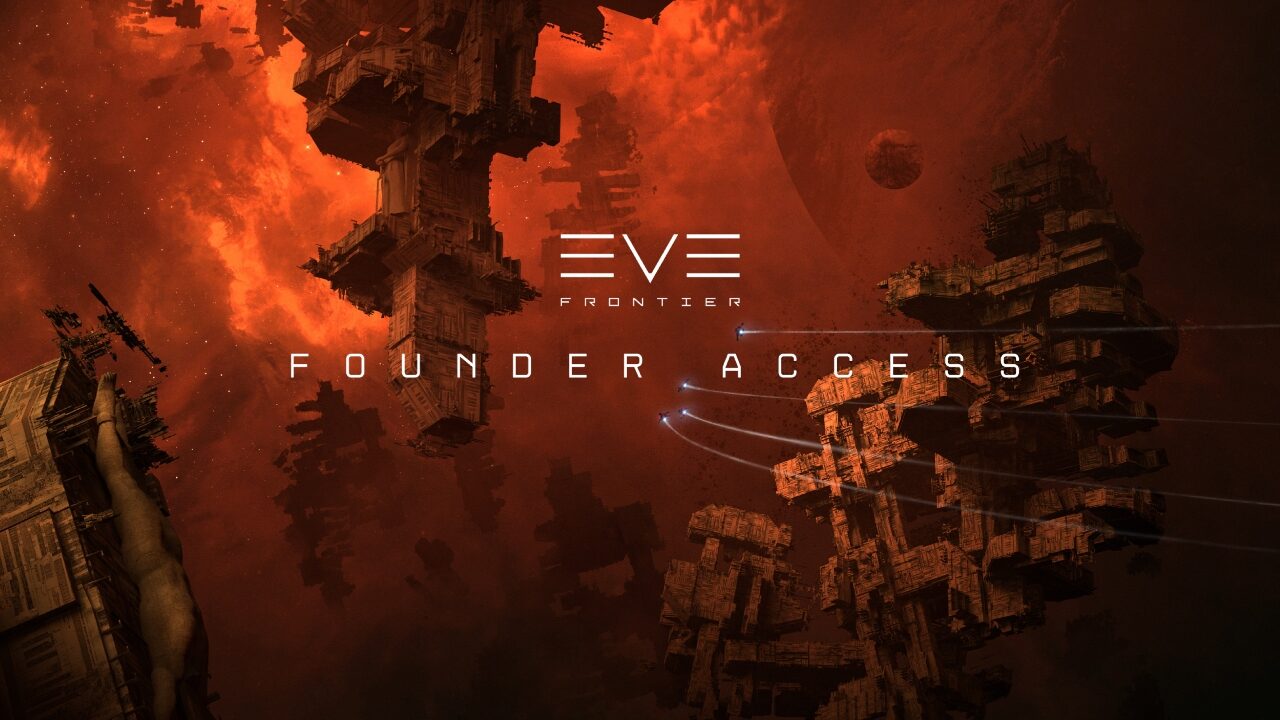
How is EVE Frontier including players in the development, much like EVE Online does and like Vanguard does?
Scott McCabe: We have a couple of ways that we’re doing it. Right now, we have our Founder Access. We opened that in December, I think it was December 10th last year. And people were able to buy themselves Founder Access. Then they get unlimited access to our live server all the way up until we launch. They get regular interaction with developers. We do streams, AMAs, quite often with them, as well as just talking with them.
They’re really, really engaged with the active community. And there’s this whole concept of, “Hey, we could just go lock ourselves in a room for like five years and come out with a game at the end of like, ta-da!” But what if it’s not what people were looking for? What if it’s completely wrong? We wasted all of our time, so the best way to make sure you’re doing the right thing is to check with the people that you’re building the game for. So we interact with them, we take their feedback on board, and we also do free periods every so often.
“Someone might come into EVE Frontier, for example, and really like the setting and things, but the survival is not what they’re looking for.”
We’ve done two now where we open the doors for anyone who wants to come in and try it without having to buy the Founder Access. And then also we close that back down again every so often, and we go back to just our founders. So we use the term “co-development” a lot. Um, but I think it’s a really great way to make sure that the game we’re building, for the people who want to live in that virtual universe, is right for them.
Why do you think CCP is one of the only studios that are really doing it this way? In every game, letting the players have a say and be involved from nearly day one rather than waiting until the first public access five years down the line.
Scott McCabe: I think it’s just been a core part of CCP for such a long time. If you think back to when CCP started in Iceland, in this remote island in the middle of the ocean, no one really had any game development experience. They didn’t really have anyone to tell you, “Oh, this is how it’s done.” So they just kind of did it. And Icelanders are, don’t tell them I said this, but they’re actually surprisingly friendly all the time, so they always want to hang out and make sure everyone’s okay and things like that. So it just makes sense that that’s how the game evolved over time.
You build this really dark financial murder hellscape, horrible place, and then the people that come in and play it are the most friendly people that you’ll ever meet. I’ve come to Fanfest for over a decade, and met some incredible people, both in-game and in person at these events. And it truly is one of the most giving and generous communities. I think we did a survey a while back in EVE Online, and more people self-identified as one of their main goals is to help other people, than people who self-identified as hunting and killing. Like it’s crazy, like it’s one of the most supportive communities.
So I think it just naturally grew from that and the fact that it’s all a single shard means that an action, no matter how small, affects everybody else. So it’s not like you’re doing this in your world, and I’m doing this in my world; it’s like we’re all doing this in the same world together. And it has a certain sort of community feeling about it.
I use a bit of a contrived example the other day, actually, I think I said it felt like when you’re achieving something more in Frontier and in EVE Online, it feels like, you know, you see those montages of the Amish putting up the barn and they’re all coming together and building up for the community. Kind of feels like that sometimes.
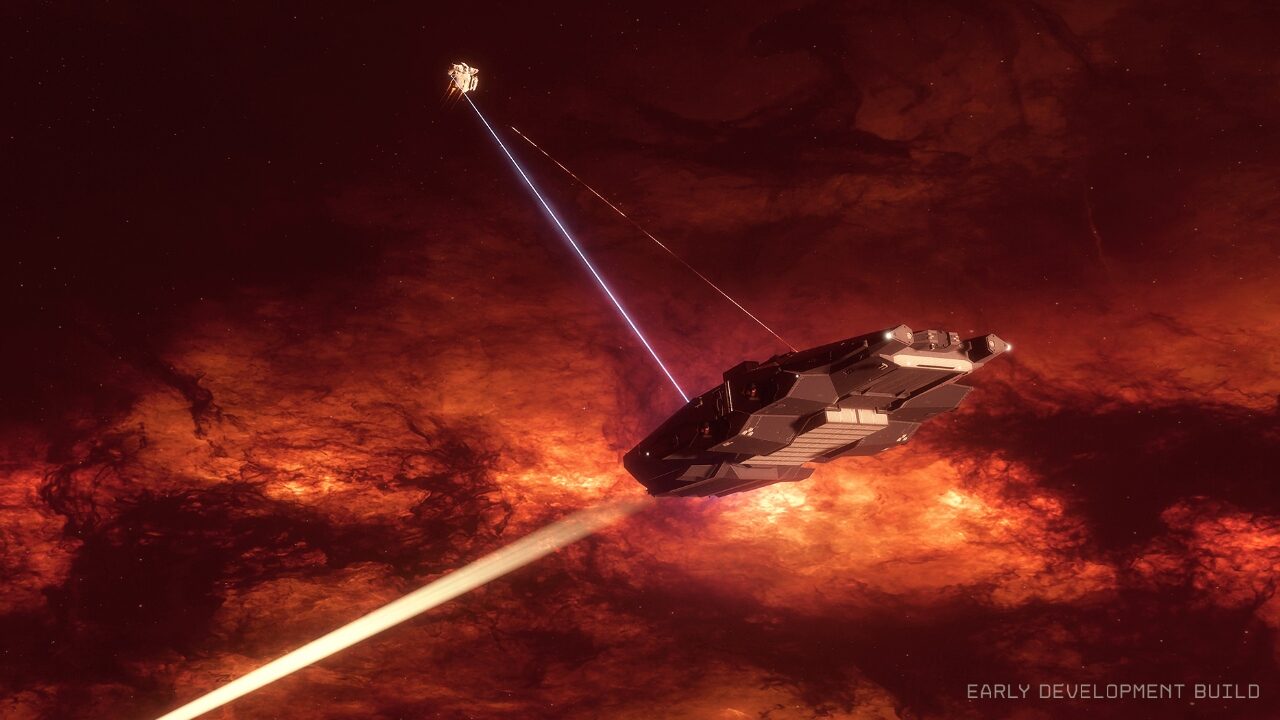
I want to talk about your experience with EVE and now heading into EVE Frontier. Do you think that this would have been a game that you would have wanted to see? Having been an EVE Online player originally.
Scott McCabe: Like I said, I’ve been playing EVE Online for 17 years. Whenever new products came out, when I was just a player, I was always interested to see where they go because I love the IP. I think that the EVE world and everything is just cool. I really like it, and seeing more ways to experience that universe was always exciting to me. Like, I remember when Valkyrie, came out and you strap on the VR goggles and you pop out of the launcher the first time, and you look around and you see the big ships around you from EVE Online, oh, man, that’s just fucking cool.
It sounds terrifying.
Scott McCabe: Yeah, it was awesome. And it’s like that. So I think I would feel like that. And then, if I’m speaking to my EVE homies, I would say EVE Frontier, at the moment, it feels like you’re camping in a wormhole with a bunch of people who are hiding and you don’t know where they are. Like, it’s spooky, but also kind of exhilarating. You’re kind of in charge of your own destiny. Almost like a, not a fresh start. It’s the wrong way of putting it, but it’s a different way to experience the universe. Very different game.
And do you think that your time as a player is helping you work on EVE Frontier now?
Scott McCabe: Oh, yes. Absolutely. I actually started as a producer and I remember when I applied, and I did specifically put in my cover letter, I was like, “Look, I’ve never worked in video games before. I’m a systems engineer in the aerospace industry, but I’ve been playing EVE Online for a very long time.” And not to like toot my own horn, but I was relatively well known, EVE Online player as well. So very experienced. And at one point in one of the interviews, I was having one of the developers, CCP Goodfellow, actually the game director, he said it’s a lot easier to teach an EVE Online player how to be a producer than it is to teach a producer about EVE Online.
Well, there you go!
Scott McCabe: Yeah. And I think the understanding of the community and how things work and what things people like to do, even like players, some of the most creative and mischievous people we will ever meet in gaming, and having come up through them, I think I’ve been able to use that to good effect.
Now, going back to the community in general, what kind of things have they been able to contribute to EVE Frontier so far since they’ve gotten Founder Access? Has it changed the game in any way?
Scott McCabe: So sometimes it’s as simple as people have an idea and we’re like, “Hey, that’s kind of cool.” And we look into it, maybe it’s something that we can do. Other times, we have an idea and they tell us in no uncertain terms it’s not very good, but then they give us reasons why, a lot of the time. And we were like, “Ah, you know what? That’s a good point. Or they’re using it, definitely not how we intended. We can get feedback from that. We also get tons of data.
We reset the world every so often because we’re not released yet. So we can set up different sorts of scenarios, almost to see what happens. And a good example of this for data purposes is we did one world reset, right at the end of a free period. So before the free period, all the founders had been building up their communities, and then all these new players came in, and they were all kind of pulling the new players to their groups.
And then the next time we did a free period, it was right at the start of a cycle, so no one had anything. So people were sort of racing to get to the top quicker. It was almost two versions of the same thing. But we get tons of information about the way people play, how people interact, and how the economy and the industry system evolve over these periods.
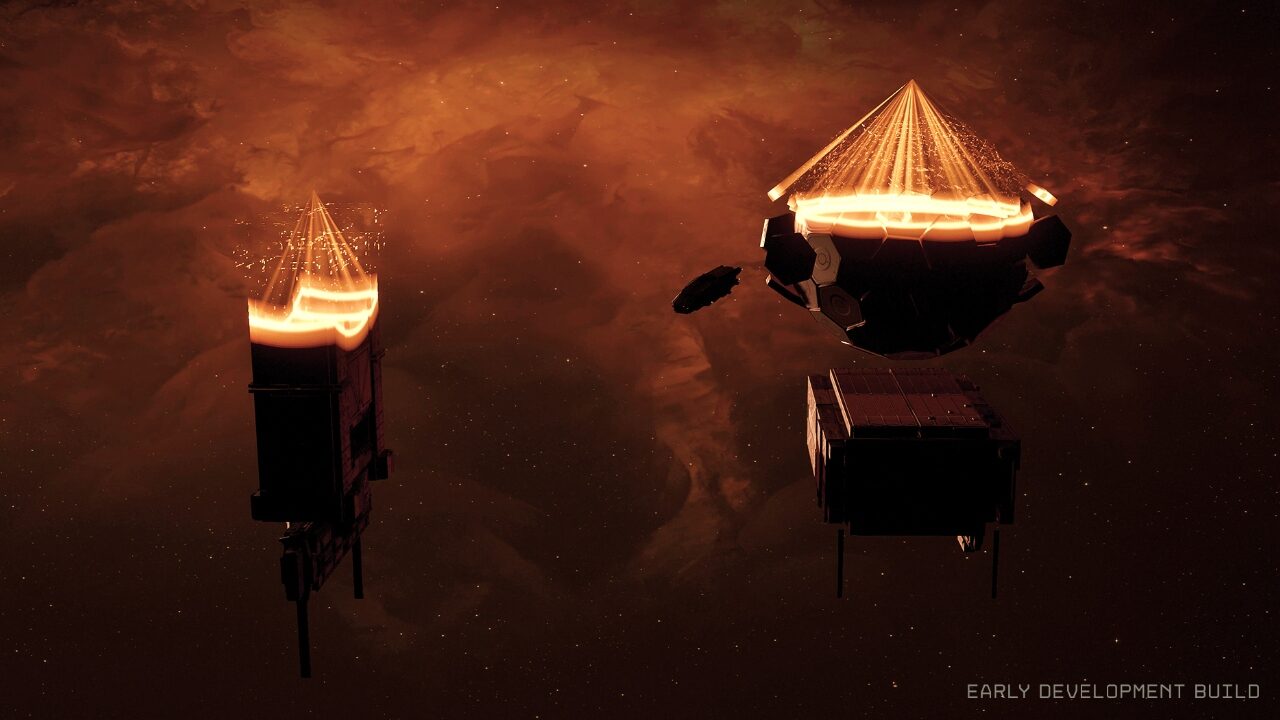
Are you usually surprised to see what happens when you are in these scenarios, or can you kind of predict what’s going to go on?
Scott McCabe: The day I’m not surprised, I will be surprised. People are always coming up with crazy things, and it’s usually like someone figures something out and then they tell us after the fact because they’ve used it to their advantage. And then they go, “Look what we did!” And I’m like, “You sons of bitches. That’s really clever.”
And EVE Frontier is going to be or is open-source?
Scott McCabe: It will be open-source. Right now, it’s not. The carbon engine, which is the engine that powers both EVE Online and Frontier, we’ve stated our commitment to making that game engine open source. And we recently, I think maybe like a month or two ago, released the first fully open-source module, which is a spatial audio module. As for the open-source, we’re moving towards open-sourcing more of the engine over time. It’s actually a monumental challenge to take some code and make it open-source, because it has to be usable by other people.
“In an EVE forever world, by being open-sourced, if something were to happen where we cease to exist, then the community will be able to keep it going themselves.”
When we started this journey, a lot of it is very bespoke. You couldn’t just set it up and use it. So, in order to make it less bespoke to our needs and more accessible, it requires some development work. But that’s beneficial for us as well, because it means we can interact more with industry-standard tools. Build better pipelines. Increase developer velocity. It’s been a lot of work, but it’s been very, very valuable.
And why the choice to go open-source? What does that benefit in EVE Frontier, and how does it work?
Scott McCabe: Iron sharpens iron. As simple as that. Open-source communities and people are able to make things better than the sum of all of its individual components. There’s this concept in security where, “Oh, if I just don’t tell anyone how my thing works, no one will build the hack into it.” That’s a terrible idea. It’ll never work. The best way to do it is like, “Look, this is how it works. Tell me the vulnerabilities,” and people are way better at fixing it.
Also, sort of on a philosophical level, we have this concept of “EVE forever.” We’ve built this virtual world that is now two and a half decades in. We intend it to go forever. We intended to outlast not only us as humans. You know, I will eventually cease to be. And the company may cease to be. Maybe, you know, one of those volcanoes goes off one day, and Iceland is gone. And for all those people who choose to live for decades in this virtual world, that would be the end.
And how many sad times have we heard of communities online, in games, where the game is shut down, and then that’s it. You know, it’s gone. There’s no way to recover that. In an EVE forever world, by being open-sourced, if something were to happen where we cease to exist, then the community will be able to keep it going themselves. And then it would be truly out there, and it would be EVE forever.
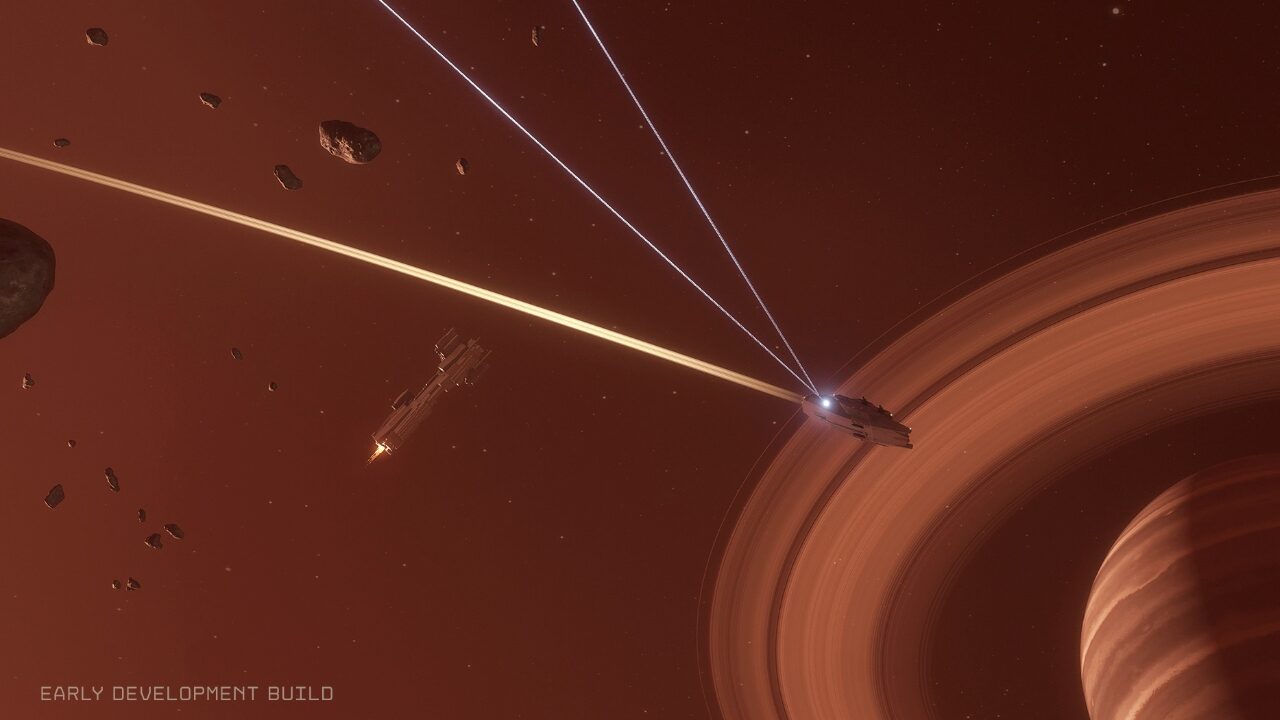
This is not exactly my expertise, but I’m hoping you can help me and my audience understand it. What does EVE Frontier have to do with blockchain?
Scott McCabe: This is a slightly more complex one, but if we can peel it back one layer, just, just for a moment, and I’ll come back to that. EVE Online. Great game. Spaceships, explosions, empires, everything. Right? It’s actually, I don’t know if you know this, great readers out there, it’s actually the world’s number one Microsoft SQL database game. It’s part of the technology stack that powers EVE Online. Whenever you unlock your spaceship, you’re doing a database transaction in a SQL database. You don’t care.
I mean, I care that you care!
Scott McCabe: I barely care. The point is, the players don’t need to care. They’re just undocking their cool spaceship. And someone is blowing up their cool spaceship, you know? And those are actually all, like, the stuff happening underneath in the tech that allows that to happen. But from the player’s perspective, they’re just playing a game.
Going back to EVE Frontier. It will be the same. It is a game that we’re building, and part of the tech stack is this blockchain we use. And our vision for the game is that it will be just as transparent as the database transactions. You don’t really need to think about it. But if you want to, you can unlock this truly unlimited third-party development capability.
So EVE Online, that database, we have the ESI, it’s a read-only API that allows developers to build and compose tools on top of this. And there are thousands of them out there, from alliance management tools, fitting tools for the game, libraries to help people develop more tools. All running off this read-only API. The blockchain allows us to do that, but also lets people write into it and unlock capabilities.
A really simple example is that we had gates in our demo, which were run by players. And if you think about a gate, you have a gate and you have a player, and the gate wants to know to let that player through. So we could make it very simple, where you just put a list of all the players you want to allow to use your gate. But then, what if you want to do something else? Like maybe your little community in The Walking Dead, this sort of environment, again, you build your gates up around your little community.
“Part of EVE Online is that your people are almost your most valuable asset.”
You want to let only people in with a special sort of visa card or something. Now you have to wait for us to implement that feature into the game as well. So instead, what we do is we put the rules of how the gate operates on the chain, which means that we just say, “Hey, you can turn it on and off,” like let people through, and you get the information of who the person is. All the bit in the middle, you can decide.
Now people will say rightly so, that you can do that in a lot of different ways. Doesn’t require a blockchain. The thing about the blockchain is that it empowers something we call trustlessness. So I come up to the gate and I say, “Let me in. I have my little visa card!” And then I have to trust that when I present that to you, you will let me in if you are the gate owner, and vice versa, you have to trust that I do, in fact, have this visa card.
By making it such that both sides can independently see and verify the logic, like, if I come up with this card, I will be allowed to go through the gate, and likewise, as the operator, you know that only people with that card will be allowed to come through. So you take it, you put it somewhere where it is totally visible and trustless, say, permissionless control. Third-party development is just totally, outrageously unlocked. And because the logic sits in this box in the middle, you truly can write what you want. You could say that only people who follow me on Twitter are allowed to use my gate, and this will work.
Right now, you could do this. You don’t have to wait for us to develop a Twitter plugin for the game. You can just make it happen. You could make it so that your gate is only online when the weather in Iceland is nice. When it’s raining, the gates go offline, and that’s just a really simple example with just the gates. Once you start to like add these things together and put more and more systems where people can start to link them together, it becomes even more powerful.
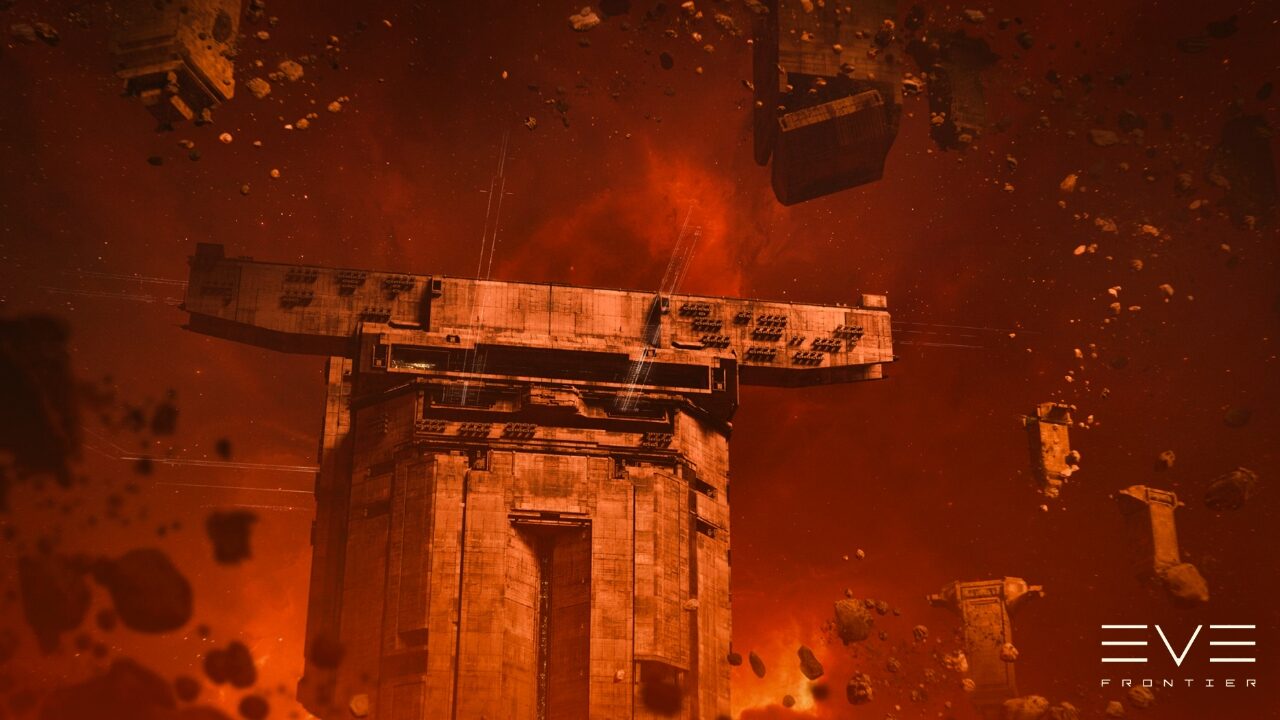
And is there any worry that being associated with blockchain can hurt EVE Frontier?
Scott McCabe: I think it’s natural and it’s fine. People are right to be skeptical. Blockchain has a bit of a reputation problem. I would argue it suffers a lot from overfinancialisation. For a lot of people, cryptocurrency is blockchain, and blockchain is cryptocurrency. That’s a use of it. This is where we led with this: “Hey, guys, look over here. Making a new game, by the way. It has blockchain in it.” We started with that because we knew it was a contentious subject.
We believe in the technology and what it will let us do. In the grand scheme of things, when it’s open-sourced, it means that if something is enshrined in an immutable ledger, the rules of the game, the physics of the game, and then we release it, no one can tamper with it because it’s just there like it’s done. Whereas if you release an open-source game, anyone can go and modify it, change it, change the rules, and then it’s just all over the place.
So it’s just this concept of as part of the long-term, like 30-, 40-year vision of open-sourcing the game and basically giving the power to the people who choose to inhabit this virtual world to control as they see fit. So it will never die. It’s one of the options that we chose, and we believe it’s the best one.
Okay, so just to be clear, the blockchain portion of EVE Frontier is not financially related at all? Like you said, blockchain is crypto, crypto is blockchain, and that’s where most people’s minds go.
Scott McCabe: Not really. The cool thing about it is you could if you wanted to, and you can do it in your own way. And we actually see this quite a lot in EVE Online, as an example, there’s a big alliance called Pandemic Horde—around 50,000 people. They’re led by a guy called Goblins, and part of EVE Online is that your people are almost your most valuable asset. So you want to encourage people to stay with your group, which means that if there are big battles losing people, being able to replace them, you just give them free ships.
You’re like, “Hey, have more ships,” or you pay them for the ships they’ve lost so that they’re not out. So they’ll always want to be there on the front lines. EVE people call this SRP or ship replacement program, but it’s very manual. You have to sit there and pay everything out. So they came up with essentially their own alliance currency called “Gobloons”, where instead of being given in-game money back, you were just credited Gobloons in their big spreadsheet, and then you could, at any point, convert that into ships or currency in the game.
So with EVE Frontier, you could do that basically using the blockchain in such a way that both sides know that it’s verifiable and you don’t have to rely on one side going, “Hey, trust me,” like, those players have to trust that the alliance executors will give them money for their Gobloons, and there’s nothing they can do about it. There’s no recourse if they say, “No, no, we don’t like you anymore, everything is forfeit.”
Whereas if they had it set up, with a sort of on-chain token like that alliance with their own token, and then set up their replacement programs to run autonomously, verifiably. So, you know, if I lose my ship, I will, according to the rules that they have set out, get one back.
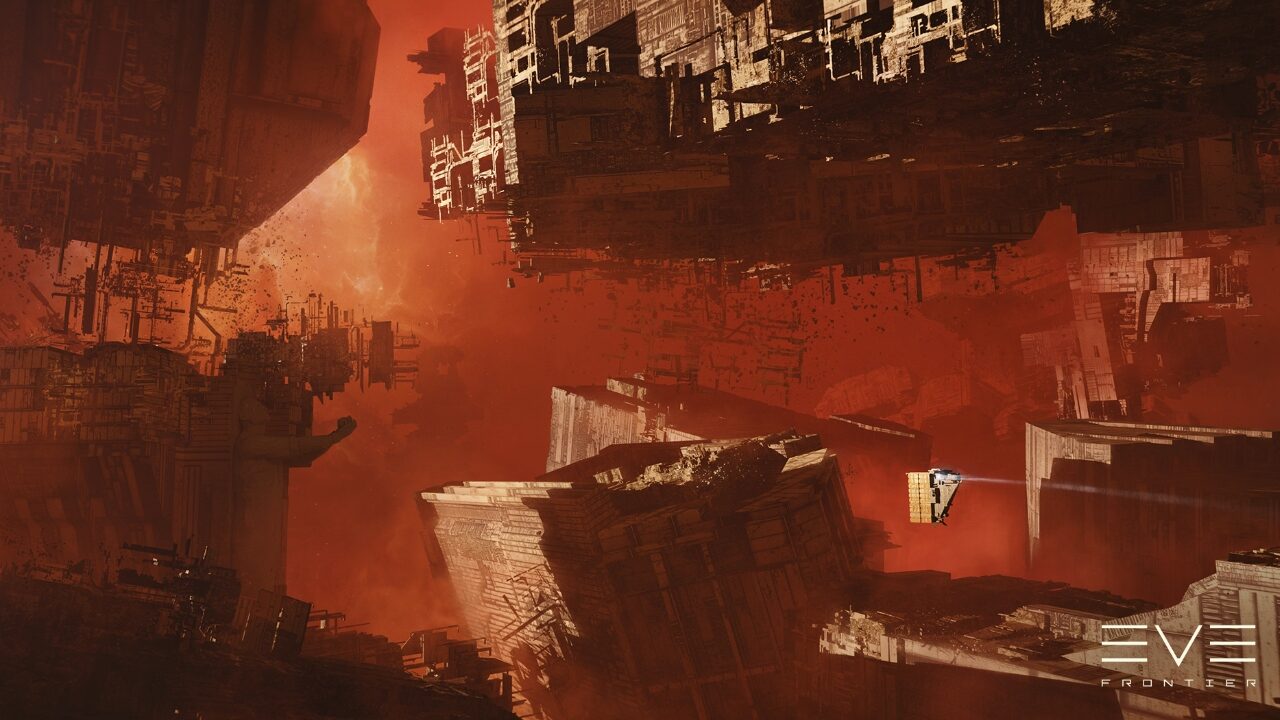
The other question I had was, I think you said that we’re not talking about how EVE Frontier fits into the EVE universe yet. Why?
Scott McCabe: Everyone loves a mystery. There’s a conceptual don’t tell. Imagine, if you will, you’re watching an exciting mystery adventure suspense thriller film. It would be a lot less exciting, mysterious and thrilling if they told you the big surprise at the start or someone spoiled it for you. It’s basically as simple as that.
Something good is coming. That’s what we can hear.
Scott McCabe: It’s not even just that. It’s just, why would we need to tell people the source of the mystery? Mystery is its own fun, reward, and excitement. Not knowing means that you can theory craft, and you can think about it. And sometimes that’s just as interesting as knowing the truth.
That’s cool. And then my last question. This is the big one. Are you ready? What is the thing you’re most excited about with EVE Frontier right now, especially as a player now? And then, what do you think the players are going to be most excited about with EVE Frontier?
Scott McCabe: So I think there’s two, and it will be the same. For me, it’s the really tactical combat opportunities and the ability to build up my little base in space, kind of almost like Rust in space, I guess. The dynamic movement, the sort of self-reliance and the fact that you have to be good to be able to succeed. And the skill ceiling is higher. I like that, I think that appeals to a lot of people.
But overall, I’m most excited about what people are going to build in this decentralized environment. Like I gave those examples about the gates and things like that. We had a hackathon. People built crazy things. Like one person built this system where you deploy a structure in space, and you had that linked with the on-chain location verified, so that it could only ever be one person who owned it in that location in space. No way to spoof that.
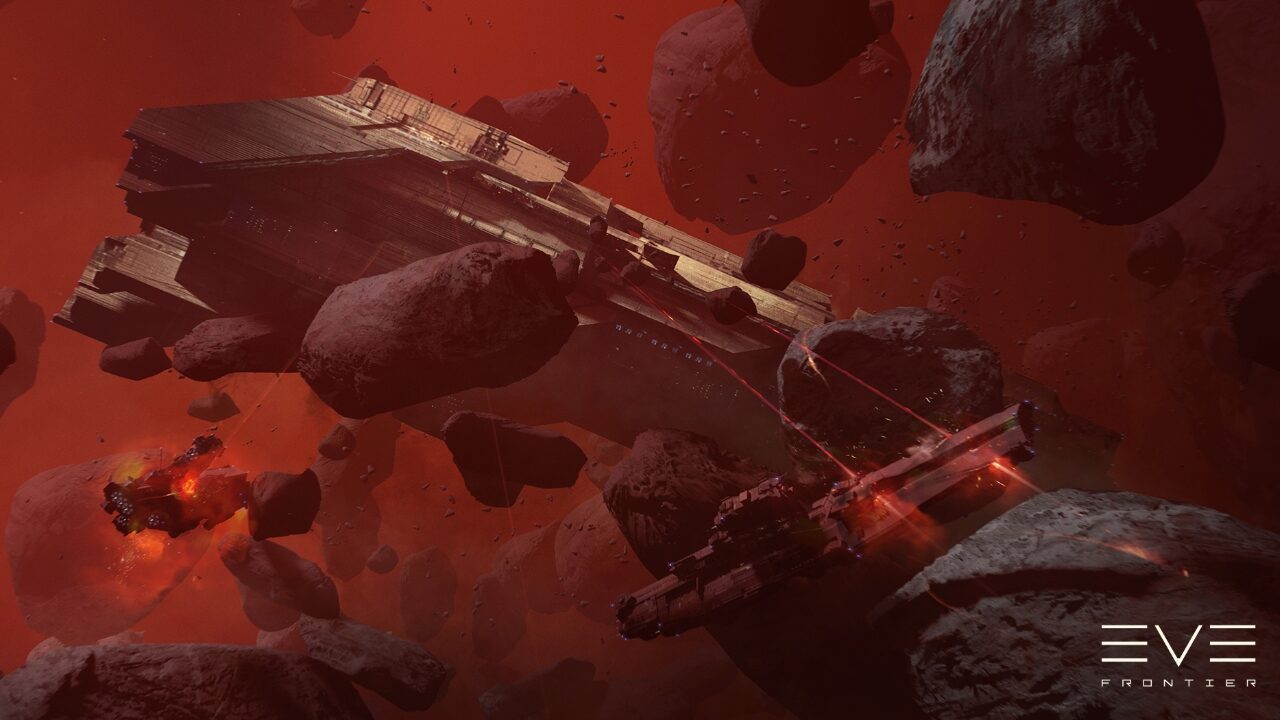
And it had a kind of planet that was generated from the seed of that environment, and you could control it. And the longer you controlled it, the more population would go. But then other people could come and blow that up. And then it, sort of, was like, well, that’s basically like a little space Tamagotchi. So you can get these Tamagotchis built in the game. And then I was like, “Well, hang on. This is also…you have everything you need to build Pokémon Go inside the game.”
Like, you can verify people have been to that location to capture a gym and stuff. So people start to run their own little Pokémon Go gyms. And then I was like, “Now we’re talking about this sort of like augmented reality game inside a virtual world.” And it’s like, like second-order augmented reality or something. That’s what I’m excited about. Not like Pokémon Go in EVE Frontier, but the fact that that’s possible.
So that’s really cool. That’s all I have for you. I will say that I came out a little more confused now that we’re landing on Pokémon Go.
Scott McCabe: Didn’t expect that one when you started, did you?
I didn’t. [laughs]
You can join EVE Frontier’s Founder access and keep up to date with the game on their official website.





